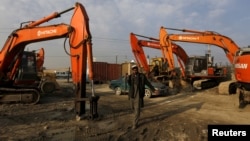The Omid Gardizi construction company on the outskirts of Kabul is at the sharp end of a painful transformation Afghanistan faces, as billions of dollars in foreign spending come to an end and Taliban violence undermines a stuttering economy.
Standing in a yard crammed with 50 pieces of hulking machinery, company owner Sayed Dilagha Mossavi said for years his work depended on NATO-led forces. Now most of them have gone.
"If they're not here, no one will use this," he said of his fleet of cranes, diggers, graders and rollers, which he estimated cost $5 million and is now gathering dust. "The work has finished."
The company employed 25 people in 2012, the year after NATO forces in Afghanistan peaked at about 140,000 troops. Today it has just three people on the payroll.
About 13,000 foreign soldiers remain, leaving Afghan government forces to battle the Taliban largely on their own.
The government does not have an estimate for the drop in off-budget military spending and aid in 2015 from levels a few years ago, but says it is billions of dollars. The country secured a $16 billion, four-year aid program from donors in 2012.
In an economy that generated less than $21 billion in annual output in 2014, according to World Bank data, the loss of billions of dollars in foreign aid and military spending has had a dramatic impact.
Reconstruction funding from the United States, Afghanistan's biggest foreign donor, has fallen from a peak of $16.7 billion in 2010 to $6.3 billion, according to the U.S. Special Inspector General for Afghanistan Reconstruction, an oversight body.
"It Will Take Time"
Security has worsened since NATO ended combat operations, with the insurgency spreading to a point where the Taliban briefly seized the northern city of Kunduz in September.
That seriously rattled confidence in an uneasy national unity government formed after disputed 2014 elections.
Economic growth is expected to be 1.9 percent this year compared with an annual average of 9.2 percent from 2001 to 2011. Domestic revenues will be equivalent to just 9.8 percent of gross domestic product, the World Bank says.
Making matters worse, more than 150,000 Afghans have fled to Europe since the beginning of the year to escape rising unemployment and violence, while the rich have stashed billions of dollars overseas.
The country is partly counting on big mining projects, including the giant, $3 billion Mes Aynak copper deposit, which has stalled amid security threats and as Chinese investors and Kabul disagree over terms.
The government also has a plan for a self-sustaining economy based on 22 programs including infrastructure and agriculture, but officials concede it is underfunded and behind schedule.
A senior Finance Ministry official said the assumed 10-year time frame for the transition to self-reliance was unrealistic.
"It's not an easy process, it will take time. Even after 10 years, we will only be less dependent on aid," said the official, who declined to be identified.
Bubble Economy
The finance ministry official acknowledged the need for more revenues, and said President Ashraf Ghani was tackling corruption and supporting the private sector.
Some businessmen scoff, saying insecurity, along with graft, red tape and government inaction, are compounding the problems of those trying to break away from the aid economy.
"We have not seen a single effort or initiative towards economic development," said Shakib Noori, of the Afghanistan Holding Group, a management and investment consultancy that has provided services to donors and is now trying to re-focus on the domestic economy.
He said Afghanistan should forget big projects for now, with security so poor, and focus on small- and medium-sized enterprises.
"We've gone after big business and failed. We need to start small businesses for local consumption," he said.
Noori and some colleagues last month opened a food shop and bakery, catering to Afghans looking for a cheap, healthy lunch, with a $20,000 investment, the first of five small projects they plan.
"It's very painful to transform from an almost 100 percent donor-driven bubble economy to a real one," he said. "But there are other opportunities. I know it's difficult. The license will take you a month."
Back at his yard, Mossavi said he hoped to off-load his machinery in the Gulf and Central Asia. "Maybe I should have opened a supermarket."





